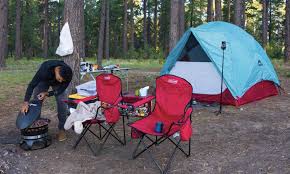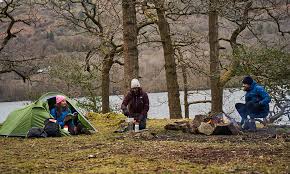Camping is a wonderful way to reconnect with nature, unplug from daily life, and experience the great outdoors. If you’re new to camping, it can feel a bit overwhelming at first, but with the right preparation, you can have a fun and enjoyable experience. This beginner’s guide will help you get started and feel confident on your first camping trip.

1. Choose the Right Campsite
When you’re starting out, it’s important to select a campsite that’s beginner-friendly. Look for campgrounds that offer easy access, basic amenities, and safety features. Many national parks and state parks have designated campgrounds with restrooms, picnic tables, and fire rings. You can also choose campgrounds with electrical hookups if you prefer to have access to some comforts like lights or charging devices.
2. Gather Essential Camping Gear
Starting camping requires a few essential items. Here’s a basic checklist:
-
Tent: Choose a tent that suits your needs. A small, easy-to-assemble two-person tent is perfect for beginners. Make sure it’s waterproof to protect against rain.
-
Sleeping Bag: Pick a sleeping bag appropriate for the season. If you’re camping in summer, go for a lighter bag. For colder weather, choose a sleeping bag designed for lower temperatures.
-
Sleeping Pad or Air Mattress: This adds comfort and insulation from the cold ground.
-
Cooking Equipment: A portable stove or campfire equipment will allow you to prepare simple meals. Don’t forget matches, a lighter, and cooking utensils.
-
Food and Water: Pack easy-to-prepare meals and plenty of water. Consider pre-packaged meals or snacks that don’t require refrigeration.
-
Headlamp or Flashlight: Bring a reliable source of light for nighttime.
3. Learn How to Set Up Your Tent
Setting up your tent may seem tricky at first, but with practice, it’ll become second nature. Follow these simple steps:
-
Choose a flat, dry spot to set up your tent, ideally not too close to water or under trees where branches could fall.
-
Lay out the tent’s footprint or groundsheet. This protects your tent from rough surfaces.
-
Assemble the poles and fit them into the designated sleeves or clips of the tent.
-
Attach the rainfly to ensure your tent stays dry during rainfall.
Practice setting up your tent in your backyard or at home before going on your first camping trip so you feel confident when it’s time to do it outdoors.
4. Practice Campfire Safety
If you plan to build a campfire, it’s important to follow basic fire safety rules:
-
Always build fires in designated fire rings or pits.
-
Keep a bucket of water and a shovel nearby in case you need to put out the fire quickly.
-
Never leave the fire unattended.
-
Completely extinguish the fire when you’re done by pouring water and stirring the ashes until they’re cold to the touch.
Fire-building is a fun and traditional part of camping, but always remember safety is a top priority.
5. Pack Smart and Keep It Simple
When it comes to camping, less is more. Focus on packing only the essentials and avoid overloading your backpack. Consider these tips:
-
Organize your gear into smaller bags to easily find what you need.
-
Use lightweight gear to make hiking to the campsite easier.
-
Plan your meals ahead of time, and pack foods that are non-perishable or easy to cook.
-
Don’t forget the small essentials: sunscreen, bug repellent, a first-aid kit, and extra clothes for warmth.
6. Prepare for the Weather
Weather can be unpredictable, so it’s important to check the forecast before heading out. Be prepared for sudden changes in temperature or rain. Bring a weather-appropriate jacket and layers that you can add or remove. If you’re camping in colder weather, bring an insulated jacket and extra blankets or sleeping bags.
7. Stay Safe and Respect Nature
Camping is all about enjoying nature, so it’s essential to follow safety tips and leave no trace principles:
-
Stay on marked trails to avoid getting lost and disturbing wildlife.
-
Keep your food stored in bear-proof containers or hung in trees to avoid attracting animals.
-
Leave no trace by packing out all your trash and respecting the environment.
-
Be cautious of wildlife, and never approach or feed animals.
8. Enjoy Simple Camp Activities
Camping isn’t just about the tent and gear; it’s about the experience. Enjoy simple activities like:
-
Hiking: Explore nearby trails and enjoy the scenery.
-
Stargazing: If you’re in a remote area, the lack of city lights provides perfect conditions for stargazing.
-
Fishing: If there’s a lake or river nearby, fishing can be a relaxing way to spend your day.
-
Photography: Capture the beauty of the natural surroundings to relive the memories.
Conclusion
Starting camping can seem intimidating, but with the right preparation, it’s an incredibly rewarding experience. Begin with choosing the right campsite, gathering essential gear, and learning basic skills like setting up a tent and building a campfire. As you get more comfortable, you’ll start to appreciate the simplicity of nature and the joy of being outdoors. Take it one step at a time, and soon, you’ll be a seasoned camper, ready for your next adventure.











